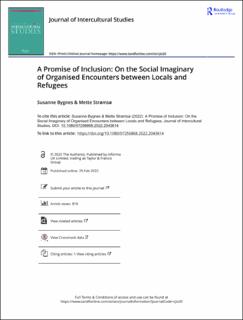A Promise of Inclusion: On the Social Imaginary of Organised Encounters between Locals and Refugees
Journal article, Peer reviewed
Published version

View/
Date
2022Metadata
Show full item recordCollections
- Department of Sociology [429]
- Registrations from Cristin [9766]
Abstract
The present study contributes an empirical analysis that makes explicit a central social imaginary underpinning organised cultural encounters between ‘locals’ and immigrants: that contact between individuals who would not otherwise meet can lead to long-term inclusion of immigrants. While research on why local populations fear or exclude newcomers is important, our study draws on interviews with locals involved in community initiatives in Norway in the wake of the refugee influx in 2015 to enquire into ideas that guide locals’ practices seeking to include. We find that a ‘promise of inclusion’ forms part of a social imaginary underpinning the organised encounters studied here, featuring ideals of meeting as equals and reciprocity in social relationships while also unveiling how practices of inequality operating within the encounters are common. Emphasising the extent to which it is possible to manage the risk of power inequalities, the study adds to the ongoing academic conversation on organised encounters by distinguishing between power inequalities operating within organised encounters and inequalities operating within the imaginary of the encounter itself. Whereas the research participants are often aware of this paradox, their motivations and approaches are still informed by the social imaginary and guided by the promise of inclusion.
